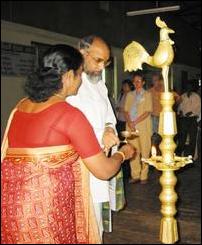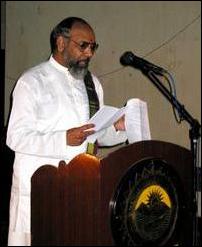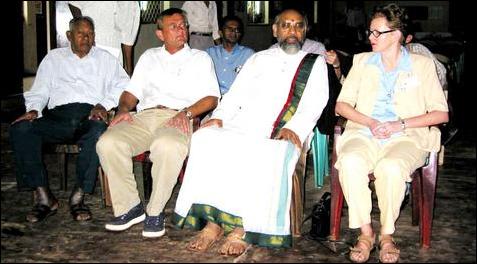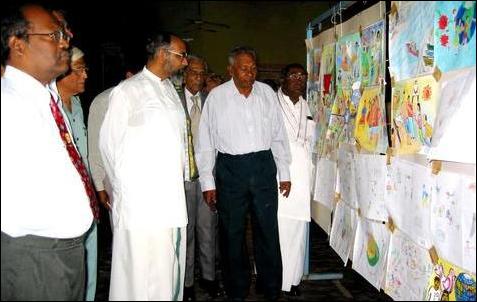| SC Judge Vigneswaran on Human Rights | |||||||
Sri Lanka’s Supreme Court Judge Mr. C.V.Vigneswaran Thursday said, “Laws such as Prevention of Terrorism Act (PTA) and Emergency Regulations (ER) are not conducive to the creation of an environment for peace. Such laws are devious methods by which conformation to the International Covenants on Human Rights are avoided, ” in his keynote address as the chief guest at the International Human Rights Day event held Thursday at Trincomalee Hindu Cultural Hall. The full text of Justice Vigneswaran speech follows: “ The subject of discussion today is very topical and fundamental to the people of the northern and eastern provinces. Peace was a farfetched concept last year but an improved environment prevails today. There has been lesser violation of Human Rights as well. But there is much to be achieved. Repair of the repercussions of the rigours of war remains. There is no guarantee that the present improved situation will endure. The future is not ours to say. But we could educate ourselves; strengthen our resolve to avoid actions, which would bring misery and hardship to others. That would be the primary purpose of a symposium of this nature.
"In ancient India the functional focus of their society was a social order based on Dharma. Dharma was binding on kings and citizens alike, on men and women alike. The king was subject to the law as any other citizen. The divine right of kings known to western political science was unknown to India. The cultural heritage of India in the field of jurisprudence has been praised and criticized but its basic guiding principle was harmony and happiness. It tried to uphold social stability based on the consensual view of the good and learned in society, of the saints and sages of yore. The aim of the ancient Indian state was “ less to introduce an improved social order than to act in conformity with the established moral order” says P.B.Gajendra Gadkar in his book “ the Historical Background and Theoretic Basis of Hindu Law-The Cultural Heritage of India-Vol II page 421. “Dharma as a concept was very wide and comprehensive. It stood for the self-sufficient principle of ushering in social harmony. Each and every person from the Monarch to the menial had his or her role to play, duty to perform. Duty was not a tyrant but a symbol of dignity to be discharged with affirmative joy. The realization of social harmony was assured in Dharma shastras by the scheme or co-ordination of conduct adapted to different conditions, status and stations of life.
“The evolution of the principle of separation of the Judiciary from the Executive was largely the result of the Hindu conception of law as binding on the Sovereign. Laws were not regarded in ancient Indian as a product of supreme parliaments and legislatures as at present. Certain laws were regarded as above all human authority. The king was given the power only to enforce law. Dharmashastras did not confer on nor recognize any legislative power in the king. That was performed by the wise men of yore. The Dharmashastras reflected such laws enacted by the Saints and Sages, the wise men. This was the most important distinction between the concept of kingship in India and the concept of kingship in the western countries. According to the western concept king was the fountain of all three limbs of the State-Legislative, Executive and the Judiciary. The arbitrary fiat of the ruler was not law in India if inconsistent with Dharma. So the chances of laws reflecting a partisan Executive were remote in ancient India. “Next we come over to the quality of understanding and tolerance shown by kings generally in India. The greatest contribution to posterity made by the Indian Hindu tradition was the broad mindedness, sympathy and the toleration of different viewpoints exhibited almost alone in India amongst the civilized communities of the earlier days. Egypt persecuted and hounded out the Jews. Racial and communal conflicts disfigured the history of Babylon. In Greece and Rome cruelty to slaves formed the basis of their marvelous cultures. Even a slave should have had his place in society. India on the other hand gave unfailing hospitality to foreign religions and foreign cultures. The Parsees flying from the oppression of the Persian king asked for and obtained succor of a wise West coast king in India. The Parsees hold a dominant position in India today. Our own Finance Minister today belongs to that great community. “Principles of tolerance and comprehension of differing creeds and ideals co-existed with those of the Ruler’s own faith. “Two great Emperors come to mind- one a Buddhist and the other a Muslim who reflected the Hindu ethos. The devotion and dedication of Samrad Ashoka to create a compassionate world order through the Eightfold Path is most impressive. “ H.G. Wells in his “ Outline of History” at page 401 states as follows: - “He organized a great digging of wells in India, and the planting of trees for sale. He appointed officers for the supervision of charitable works. He founded hospitals and public gardens. He had gardens made for the growing of medicinal herbs. Had he had an Aristotle to inspire him, he would no doubt have endowed scientific research upon a great scale. He created a ministry for the care of the aborigines and subject races. He made provision for the education of women. He made-he was the first monarch to make-an attempt to educate his people into a common view of the ends and way of life” “ Emperor Akbar was magnanimous as a Muslim ruler in Hindu country.
Let me list some of his achievements as given by M.Rama Jois in his book
“ Legal and Constitutional History of India” Vol: II Page 8- “ H.G.Wells paying tribute to Emperor Akbar in his “ The Outline of History” 8th edition page 402 said as follows: - “ Akbar’s distinctive quality was his openness of mind. He set himself to make every sort of able man in India, whatever his race or religion, available for the public work of Indian life. His instinct was the true statesman’s instinct for synthesis. His empire was to be neither a Moslem nor a Moghul one, nor was it to be Rajput or Aryan, or Dravidian, or Hindu, or high or low caste, it was to be Indian. “But these great kings showed compassion, understanding and concord. Human rights’ culture in ancient India meant the grand infusion of noble values and Dharmic principles as integral to good governance. Dharma, which was the pivotal idea, which influenced both Ashoka and Akbar, in its wider connotation and articulation, enshrined Human Rights. “ The Human Rights that we are discussing today is largely Western vintage. The Western quest for people’s rights gave a sharper edge to what we now call Human Rights. The English Bill of Rights, the American Declaration of Independence and the French Declaration of the Rights of man and Citizen, sprouted from the concept of the Universal Human Rights. The eighteenth century in Europe and America had clearly and unequivocally proclaimed the inalienable and imprescriptible rights of Man. The development of the conception of Human Rights was profoundly historical, expressing the aspirations and seeking to remedy the ills of particular places and times. Human Rights, thus in a modern sense is an idea with a history, an idea that changed in both content and social function during its evolution. For example Charles I provoked a civil war in England. He was tried at Westminster and beheaded at White Hall. What was significant was that a king was tried as a king and sentenced for treason by the sovereign people. The impact of such conduct in or around 1649 was felt 130 years later, across the Atlantic in America in a Declaration of Rights on the 12th of June 1776. The people of Virginia assembled in a free convention on that day and asserted as follows: - 1. That all men are by nature equally free and independent and, have certain inherent rights, of which, when they enter into a state of society, they cannot by any compact deprive or divest their posterity; namely, the enjoyment of life and liberty, with the means of acquiring and possessing property, and pursuing and obtaining happiness and safety. 2.That all power is vested in, and consequently derived from, the people, that magistrates are their trustees and servants, and at all times amenable to them. 3. That Government is, or ought to be, instituted for the common benefit, protection, and security of the people, nation or community, of all the various modes and forms of Government, that is best which is capable of producing the greatest degree of happiness and safety, and is most effectually secured against the danger of misadministration; and that, when a government shall be found inadequate or contrary to these purposes, a majority of the community hath an indubitable, unalienable, and indefensible right to reform, alter or abolish it, in such manner as shall be judged most conducive to the public weal” “The declaration of the thirteen states of the United States of America on 4th July 1776 reaffirmed Human Rights in classic diction. So too the French Declaration of 1789. “Eugene Kamenka in “ Ideas and Ideologies of Human Rights” was of view that the demand for rights in the seventeenth and eighteenth centuries was demand against the existing state and authorities, against despotism, arbitrariness and the political disenfranchisement of those who held different opinions. Again at page 5 of the book he stated “ The demand for rights in the nineteenth and twentieth centuries becomes increasingly a claim upon the state, a demand that it provide and guarantee the means for achieving the individual’s happiness and well being, his welfare. These two different conceptions of rights, as we shall see, linked the opposed conceptions of “ freedom from” and “freedom to “ stand in constant danger of fundamental conflict with each other- a conflict that dominates our contemporary world. “ This shift from demanding against the state in the seventeenth and eighteenth centuries to making demands upon the state in the nineteenth and twentieth centuries contributed to the recognition by the world community of the existence of human rights and fundamental freedoms transcending the laws of sovereign states The United National Charter and more specifically the universal Declaration of Human Rights approved without dissent in December 1948, gave hope to people all over the world that thereafter they could turn to the Charter and the Declaration for help, guidance and inspiration. “ It is the fact that human rights and fundamental freedoms are now being increasingly recognized as transcending the indigenous laws of sovereign states which has given hope for peace. Peace in the world is dependent on the power of the united moral forces within it. Merely because Human Rights have been enacted, merely because a country is a signatory to various Conventions which expect confirmation to their clauses, merely because governments day in day out mouthing their appreciation of the value, feasibility, and desirability in conforming to the protection of Human Rights, would not mean Peace was around the corner. “Man has still not jettisoned his savaged insanity. Peace on earth is possible only when human beings wherever they be, are able to reflect in themselves a supra mental sanity, not ordinary soundness of mind alone. “Learned Hand said: “ Man may be a little lower than angels, but he has not yet shaken off the brute. His passions, his thinking, his body, carry their origins with them. His path is strewn with carnage; the murderer lurks always not far beneath, to break out from time to time, peace resolutions to the contrary notwithstanding. What he has gained has been with immeasurable waste; what he shall gain will be with immeasurably more… He must grope his way through the murk, as his remote forerunners groped, in the dark, hot world in which they moved. Look where he will, there are no immutable laws to which he can turn; no, not even that in selfless abnegation he must give up what he craves, for life is self-assertion. Conflict is normal; we reach accommodation as wisdom may teach us that it does not pay to fight” “But it is equally right to say that the brute in Man even if it be hibernating in the deep recesses of his mind are disturbed and awoken by thoughtless individuals and spiteful state governments. Let us not forget that Hugo Grotius, one of the greatest Jurists of all times and considered the father of modern humanitarian jurisprudence, defined the state as “ an association of free men, joined together for the enjoyment of rights and for their common interest” and opined that if usurpation of such rights by the ruler happened, people had a right to overthrow their ruler. The State and the sovereign envisioned by Grotius enjoyed sovereign power as transferred by the people to be exercised according to the natural law and the law of nations. If the ruler misused his power flagrantly a right to revolt was permissible. In order to save human liberty from power hungry rulers, Montesquieu devised the doctrine of separation of powers. “ Constant experience shows us,” said Montesquieu “ that every man invested with power is apt to abuse it and to carry his authority as far as it will go”. To prevent such abuses it was necessary that power should be checked by power. In Montesquieu’s opinion that form of government will be safest in which three powers- legislative, executive and judicial-are separated; that is made independent of each other and entrusted to different persons or group of persons. Furthermore according to Montesquieu they should be so constituted that they hold one another in check. “ It is necessary to realize that political thinkers and jurists were not writing for entertainment but were moulding militant ideas to shape changes for the better of human lot and Human Rights. What is the relevance of all this to the Human Rights situation in Sri Lanka today? What experiences other countries had gone through, what writers world over had foreseen in the evolution of states from their perception of men and matters and history, are no doubt relevant when our own problems come to examined. Our ancients too were nurtured in the Dharmic tradition. Our kings were not above the law. They only had the power to enforce the law laid down by wise men. Each person from king to the peasant had his or her duty to perform. It was a duty-based society. “ With the coming of the Western nations the western ideas and thoughts percolated into our system. So long as the Westerners were here every person of whatever caste, creed or community in this country was a member of a colony or owing allegiance to a common foreign ruler. In that way a commonality had been forged for us by the foreign rulers. In the eyes of the foreign ruler all citizens of this country were colonial subjects. They had equal rights inter se. Merit was the basis of selection to Government service. The minorities were as much colonial subjects as the members of the majority community. The minorities failed to adequately perceive the effect of a change over from foreign based independent ruler to a majority community controlled government. May be Sir P.Ramanathan during the last fifteen years of his life in this world had his reservations. But a vast slice of the minorities were naïve to say the least. Mohamed Ali Jinnah in India perceived it. In any event ideas of liberty and freedom naturally affected the people of this country, both majority and minority, and without war we were able to drive the foreigners away. “ But what was significant at the time of independence was that The Ceylon (Constitution) Order in Council 1946 retained Section 29 which delineated the power of Parliament to make laws. The Parliament was to make laws for the peace, order and good government of the Island (Section 29(1). No such law could prohibit or restrict the free exercise of any religion or make persons of any community or religion liable to disabilities or restrictions to which persons of any communities or religion any privilege or advantage which was not conferred on persons of other communities or religions or alter the Constitution of any religious body except with the consent of the governing authority of that body (Section) 29(2)). It was also enacted in Section 29(3) that any law made in contravention of sub-section 2 was to the extent of such contravention, void. “ Though insufficient, Section 29 of the first Ceylon Constitution was a check on the passing of discriminative laws. Despite such law the Sinhala Only Act No: 33 of 1956 were brought into effect in 1956. Kodeeswaran’s Case in the District Court found the law to be discriminative. The case went up to the Privy Council on another legal matter and the Supreme Court of Ceylon was directed by the Privy Council to make its determination on the order made by the District Judge. This was not to be. Before the Supreme Court could finally determine the case a new constitution was enacted in 1972 and then in 1978 where Section 29 was missing. The power of courts to declare laws to be ultra vires the Constitution was also removed with certain inadequate provisions being incorporated in lieu. The parliament became supreme legislatively but the fact that Northern and eastern provinces were different from other seven other provinces in climate, topography, culture, language and even religions was not perceived adequately. This led to the enactment of laws, which were not sympathetic towards the rights, and aspirations of the people resident in Northern and Eastern provinces. Demographic disturbances, which took place around the time of independence in these two provinces, had the stamp of legality on account of the legislative supremacy of parliament, which had an overwhelming majority of members from the seven provinces occupied by the majority community. With the armed forces calculatedly depriving members of the Tamil community a place in its ranks, it was to be expected that soon the occupation of areas in the North and East by the armed forces was to be perceived as an occupation by an alien community unsympathetic towards the aspirations and welfare of the indigenous people of these two provinces. There was a marked attempt by the armed forces to protect the welfare of the recent settlers from the South, specially around Trincomalee. “ Human rights violations by State agencies took a communal twist buttressed by draconian laws passed to the detriment of the people occupying these areas. The people of these two provinces were administratively, economically, educationally and socially discriminated against. “A government has a right to use force legally on its subjects under the pretext of maintenance of law and order. But any reaction to the wrongful and indiscriminate use of such force by any government would immediately be stamped as treason or now fashionably as terrorism. So far the term “terrorism” has not been adequately defined in any law in Sri Lanka, though we have had Emergency Regulations (ER) and Prevention of Terrorism Act (PTA). The PTA was brought in, to be in operation temporarily but has been in force from 1979 upto date. Of course even the youth from the South have been at the receiving end of the provisions of the ER and the PTA. Such laws it must be noted are not conducive to the creation of an environment for peace. Such laws are devious methods by which conformation to the International Covenants on Human Rights are avoided”. “ Nevertheless we have an environment today which is to be welcomed by all peace loving citizens. But unless the factors which create dissension and reaction to the discriminatory laws, rules and regulations which do not take into consideration the feelings and aspirations and rights of substantial sections of people are removed, peace will not be easy to attain. Absence of war is not peace. Co-existence based on understanding, eschewing violence as a method resolving conflicts but at the same time giving wholehearted support to the Human Rights of the discriminated sections of society, is the surest way of peace. “ Let us hope that the present environment of no war situation
would soon blossom out into a situation of peaceful co-existence
respecting and recognizing the human rights of all citizens of the
blessed isle. |
|||||||



